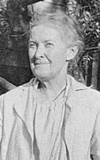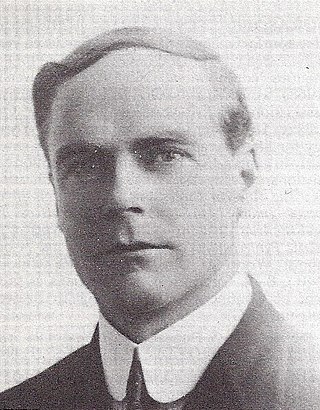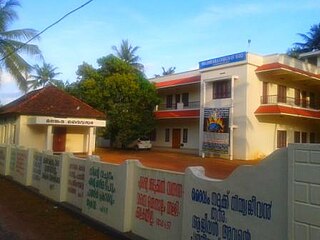
Speaking in tongues, also known as glossolalia, is an activity or practice in which people utter words or speech-like sounds, often thought by believers to be languages unknown to the speaker. One definition used by linguists is the fluid vocalizing of speech-like syllables that lack any readily comprehended meaning. In some cases, as part of religious practice, some believe it to be a divine language unknown to the speaker. Glossolalia is practiced in Pentecostal and charismatic Christianity, as well as in other religions.
Pentecostalism or classical Pentecostalism is a Protestant Charismatic Christian movement that emphasizes direct personal experience of God through baptism with the Holy Spirit. The term Pentecostal is derived from Pentecost, an event that commemorates the descent of the Holy Spirit upon the Apostles and other followers of Jesus Christ while they were in Jerusalem celebrating the Feast of Weeks, as described in the Acts of the Apostles.
The Third Great Awakening refers to a historical period proposed by William G. McLoughlin that was marked by religious activism in American history and spans the late 1850s to the early 20th century. It influenced pietistic Protestant denominations and had a strong element of social activism. It gathered strength from the postmillennial belief that the Second Coming of Christ would occur after mankind had reformed the entire Earth. It was affiliated with the Social Gospel movement, which applied Christianity to social issues and gained its force from the awakening, as did the worldwide missionary movement. New groupings emerged, such as the Holiness movement and Nazarene and Pentecostal movements, and also Jehovah's Witnesses, Spiritualism, Theosophy, Thelema, and Christian Science. The era saw the adoption of a number of moral causes, such as the abolition of slavery and prohibition.
The Pentecostal Free Will Baptist Church (PFWBC) is a Holiness Pentecostal denomination of Christianity with Free Will Baptist roots. The PFWBC is historically and theologically a combination of both denominational traditions, having begun as a small group of Free Will Baptist churches in North Carolina that accepted the teachings of Holiness movement, and later, accepting the teaching of a third work of grace spread by the Pentecostal revival.
The Azusa Street Revival was a historic series of revival meetings that took place in Los Angeles, California. It was led by William J. Seymour, an African-American preacher. The revival began on April 9, 1906, and continued until roughly 1915.

William Joseph Seymour was an African-American holiness preacher who initiated the Azusa Street Revival, an influential event in the rise of the Pentecostal and Charismatic movements. He was the second of eight children born to emancipated slaves and raised Catholic in extreme poverty in Louisiana.
The Latter Rain, also known as the New Order or the New Order of the Latter Rain, was a post–World War II movement within Pentecostal Christianity which remains controversial. The movement saw itself as a continuation of the restorationism of early Pentecostalism. The movement began with major revivals between 1948 and 1952 and became established as a large semi-organized movement by 1952. It continued into the 1960s. The movement had a profound impact on subsequent movements as its participants dispersed throughout the broader charismatic and Pentecostal movements beginning in the 1960s.

Charles Fox Parham was an American preacher and evangelist. Together with William J. Seymour, Parham was one of the two central figures in the development and early spread of American Pentecostalism. It was Parham who associated glossolalia with the baptism in the Holy Spirit, a theological connection crucial to the emergence of Pentecostalism as a distinct movement. Parham was the first preacher to articulate Pentecostalism's distinctive doctrine of evidential tongues, and to expand the movement.

Agnes Ozman (1870–1937) was a student at Charles Fox Parham's Bethel Bible School in Topeka, Kansas who was known for being the first of Parham's students to speak in tongues. Although her experience came later than the Shearer Schoolhouse Revival and comparable events, it was Ozman's experience that became widely known, helping to launch the modern Pentecostal-Holiness movement in the early 20th century.

The Assemblies of God USA (AG), officially The General Council of the Assemblies of God, is a Pentecostal Christian denomination in the United States founded in 1914 during a meeting of Pentecostal ministers at Hot Springs, Arkansas, who came from a variety of independent churches and networks of churches. The Assemblies of God is a Finished Work Pentecostal denomination and is the U.S. branch of the World Assemblies of God Fellowship, the world's largest Pentecostal body. With a constituency of 2,928,143 in 2022, the Assemblies of God was the ninth largest Christian denomination and the second largest Pentecostal denomination in the United States.
The Fire-Baptized Holiness Church was a holiness Christian denomination in North America and much of the denomination was involved in the early formation of Pentecostalism, the advent of which caused a schism in the church; it continues today in the following denominations: International Pentecostal Holiness Church, Fire Baptized Holiness Church of God of the Americas, Bible Holiness Church and Wesleyan Holiness Alliance.
Finished Work Pentecostalism is a major branch of Pentecostalism that locates sanctification at the time of conversion; afterward the converted Christian progressively grows in grace. On the other hand, the other branch of Pentecostalism—Holiness Pentecostalism teaches the Wesleyan doctrine of entire sanctification as a definite second work of grace, which is a necessary prerequisite to receive the baptism in the Holy Spirit. Finished Work Pentecostals are generally known to have retained the doctrine of progressive sanctification from their earlier Reformed roots, while Holiness Pentecostals retained their doctrine of entire sanctification from their earlier Wesleyan roots.

William Howard Durham was an early Pentecostal preacher and theologian, best known for advocating the Finished Work doctrine.
A revivalist is a person who holds, promotes, or presides over religious revivals. A secondary definition for revivalist is a person who revives customs, institutions, or ideas. The definition has become more robust in recent decades, and has been revised and adapted by American Charismatic and Pentecostal Christians to be someone who "recognizes that God's manifest presence transforms lives and cultures." A revivalist can also include someone that either presides over, or actively pursues, a religious re-awakening or restoration to spiritual ideas, orthodoxy, religious or personal experiences, and/or communal pursuit of divine occurrences.

Malankara Church of God Thrikkannamangal is a church in Kottarakkara, Kerala, India, originally known as Malankara Poorna Suvisesha Sabha.
Pentecostalism is a renewal movement within Protestant Christianity that places special emphasis on a direct personal relationship with God and experience of God through the baptism with the Holy Spirit. For Christians, this event commemorates the descent of the Holy Spirit upon the followers of Jesus Christ, as described in the second chapter of the Book of Acts. Pentecostalism was established in Kerala, India at the start of the 20th century.

The Swedish Pentecostal Movement is a Pentecostal movement in Sweden. Many, but not all, of these, are members of the Pentecostal Alliance of Independent Churches, which was founded in 2001. The Pentecostal movement spread to Sweden by 1907 from the 1904–1905 Welsh Revival and the Azusa Street Revival in Los Angeles in 1906.
Howard Archibald Goss (1883–1964) was a North American Oneness Pentecostal pastor and evangelist. He became the first superintendent of the United Pentecostal Church International, after it was formed from the merger of two Oneness Pentecostal organizations. Previously, he had been an original member of the Assemblies of God, until he left it after it strongly affirmed the Trinitarian position.
Lucy F. Farrow (1851–1911) was an African American holiness pastor who was instrumental in the early foundations of Pentecostalism. She was the first African American person to be recorded as having spoken in tongues, after attending the meetings of Charles Fox Parham, and is credited for introducing William J. Seymour to this understanding.

Holiness Pentecostalism is the original branch of Pentecostalism, which is characterized by its teaching of three works of grace: [1] the New Birth, [2] entire sanctification, and [3] Spirit baptism evidenced by speaking in tongues.








